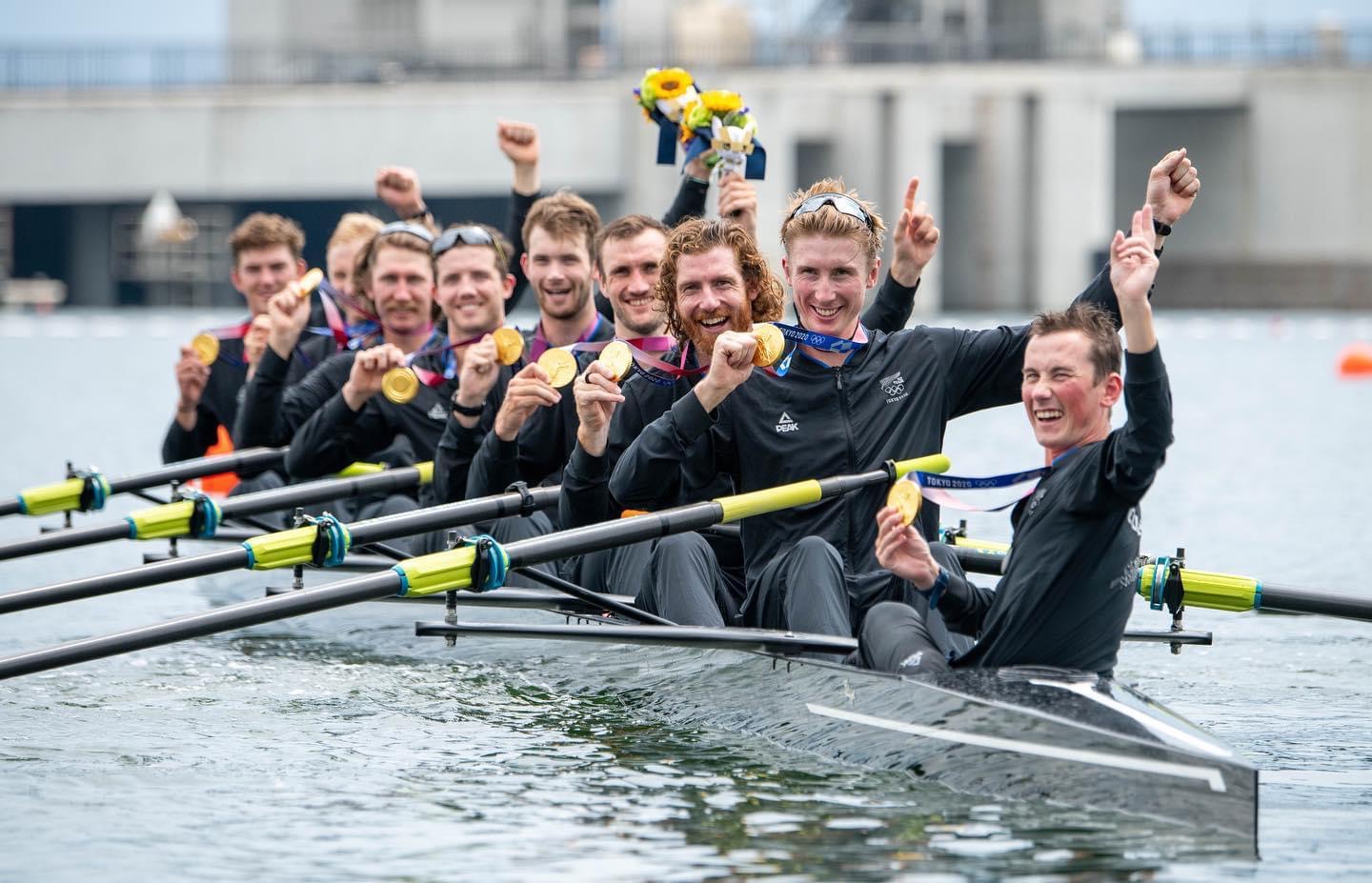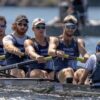CREW: Yale crew members who rowed in Tokyo reflect on Olympics
In the 2016 Rio Olympics, Yale Crew was represented by three rowers. This past summer, 11 current and graduated students rowed in Tokyo Bay, with a bronze and gold medalist amongst them.

Courtesy of Vera Bucse - Art of Rowing
Out of the 18 Bulldogs who competed in the Tokyo Olympics this past summer, 11 were rowers representing six different countries.
Four of these Olympic rowers spoke to the News about their experiences: Former Yale heavyweight rower Charlie Elwes ’19 represented Great Britain in the men’s eight. Andrin Gulich ’22, who is currently on a leave of absence, rowed in Switzerland’s men’s four. Current students Christina Bourmpou ’25 and Dan Williamson ’23, competed in Greece’s women’s pair and New Zealand’s men’s eight, respectively. Three Yale rowers walked away with medals: Elwes and teammate Ollie Wynne-Griffith ’17 with bronze in addition to Williamson with gold. Williamson’s gold is Yale heavyweight crew’s first gold medal since 1964.
“Being amongst the village, in the dining halls with just thousands of athletes at the top of their game from all over the world, from every sport … it’s an extremely stimulating experience to be a part of that group of people and to know that you also belong there as well,” Williamson told the News.
After initially declining an offer to return to New Zealand and prepare for the Tokyo Olympics, Williamson returned home at the onset of the pandemic, where he trained for a year before making it onto the team. In March 2021, he was officially selected into the New Zealand men’s eight, which had not yet officially qualified for the Games. Later in May, the crew competed in Switzerland, and they won one of the last two spots.
Gulich returned home to Switzerland in March 2020 and decided to join the national team in the fall when there was an unexpected opening. At that time, Gulich was also taking classes remotely.
“The two guys who were supposed to be spares for the Olympics decided they didn’t want to do another year, so that was kind of my lucky situation because they needed a spare to start with, so they invited me to be one of those six guys,” Gulich said.
Bourmpou and Elwes followed different paths to the Olympics.
Bourmpou started rowing for the Greek National Team in 2016 as a junior in high school. At that time, she was not initially aiming for the Olympics, but in 2018, she found her crewmate and competed in the 2018 Summer Youth Olympics in the women’s pair event, where she won gold. Bourmpou qualified for the Tokyo Olympics in the summer of 2019 after coming in 11th, the last qualifying spot for her event.
The British rowing team selected Elwes twice. The first time was in March 2020, and shortly afterwards, he was sent home for remote training. The second time was a year later.
“It was a surreal experience … it is supposed to be one of the best moments of your life — being selected to your first Olympics — and right after that we got told that we were going home,” Elwes said. “It was a weird situation to be in.”
Gulich told the News that he essentially started preparing for the Olympics the moment he began rowing, but the volume of training simply increased once he qualified for the Games. Williamson similarly explained that one cannot just switch it on months prior; instead, it “builds on months and months and even years of work.”
For Williamson, the main difference between training at Yale and in preparation for the Olympics was the frequency and intensity. He added that the crew rowed anywhere from 200 to 250 kilometers per week, with sessions two to three times a day, with just Sundays off. Gulich and Elwes completed similar training programs.
Bourmpou, unfortunately, injured her ribs in April, which meant she could not train fully for two months in the spring of 2021. She told the News that she returned to training on the water three weeks before the Olympics.
“They sent us home after we found out the Olympics were postponed, and we had to train in our house for two months, so we were not in the best place,” Bourmpou said. “It was really hard, and I actually thought of stopping twice or three times because it got really lonely and when you get tired and you have no one to help you through that training, it gets really bad.”
But Bourmpou pushed her way through and came in fifth place in her heat in her first Olympic race in the women’s pair. In both the repechage and semifinal, Bourmpou and her pair partner came in first, ultimately advancing the duo to the A final, where they ended up in fifth place. In their semifinal, the Greek pair beat the ultimate bronze medalists — Caileigh Filmer and Hillary Janssens of Canada — and set a world record of 6:48.70 before it was broken by just over a second in the following semi.
Williamson and his crew arrived second in their heat and moved on to the repechage prior to advancing to the finals. According to him, the crew needed that second race in order to be fully prepared for the finals.
“That extra race was extremely beneficial,” Williamson said. “It gave us time to figure it out. We made a lot of changes, technically and rhythmically, between the heat and the repechage. We were so confident and happy with those changes [that] we said, let’s do that again in the final.”
Similarly, Gulich and Elwes did not qualify directly from their respective heats to the final and had to compete in the repechage. Ultimately, Elwes secured a bronze medal with the GB men’s eight and Gulich came in third in the B final.
Williamson made note of the role Yale crew has played in the international rowers’ impressive success.
“The number of Yale rowers [competing in the Olympics], current or alumni, speaks volumes of the program and of the coaches and what they have created here,” Williamson said. “It’s really special and an amazing feeling to be able to line up against guys that I’ve raced with. Charlie [Elwes] was a guy that was in my boat here in 2019, and I look across the lake and see him sitting there. Different countries, both essentially living our dreams and … it’s like, well we made it.”
Rowing at the 2020 Tokyo Olympics concluded on July 28, 2021.
Correction, Sept. 8: The article has been updated to reflect the names of the correct Olympic bronze medalists in the women’s pair event, Caileigh Filmer and Hillary Janssens of Canada.
Correction, Sept. 12: The article has been updated to include the medal won by Ollie Wynne-Griffith ’17.










